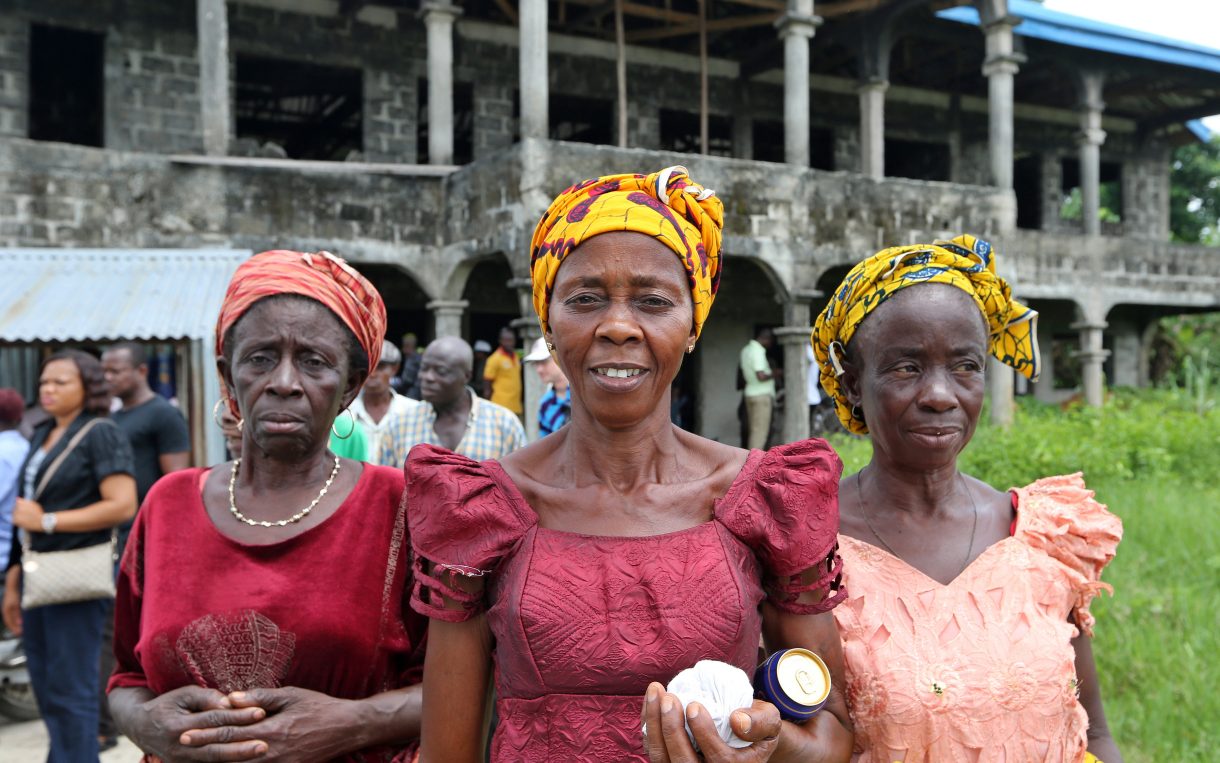Is transparency biased against women?
 Women walk home after attending meeting at the community town hall in Rumuekpe Revers State in Nigeria's Niger Delta. The Rumuekpe community was heavily destroyed during the conflict among various rival militants and cult gangs over access to oil money which lead to inter-communal violence that killed many and displaced thousands between 2005-2008. (Photo: George Osodi / Panos for Oxfam America)
Women walk home after attending meeting at the community town hall in Rumuekpe Revers State in Nigeria's Niger Delta. The Rumuekpe community was heavily destroyed during the conflict among various rival militants and cult gangs over access to oil money which lead to inter-communal violence that killed many and displaced thousands between 2005-2008. (Photo: George Osodi / Panos for Oxfam America)
Women, extractives and social accountability.
If extractive industries have a questionable record on delivering development outcomes, their track record on improving the lives of women in developing countries is even worse. Women tend to bear the brunt of the impacts of resource extraction.
For this reason, Oxfam has made gender justice a focus of our global extractive industries program. Defending women’s rights is critical for ensuring the risks of extractive industries are mitigated and that their potential benefits are shared by all. To this end, Oxfam commissioned researchers at Middlesex University to review the literature on “social accountability”, gender and extractive industries. Social accountability has become a common approach for empowering citizens in ways that address corruption and improve service delivery. Social accountability works by exposing citizens to the functions of the state (for example, including them in budget processes or providing them with information on service delivery) so that they can observe any irregularities and demand greater accountability from their governments.
The focus of the work was to understand whether there might be particular barriers to women’s inclusion in social accountability efforts. In particular we were interested to know whether there might be gender barriers to engaging women in accountability work that aims to leverage new transparency disclosures in the extractive industries.
An overarching finding from the research was that there is a lack of literature focusing specifically on the gender challenges of social accountability programming. Despite this, the work was able to identify a number of characteristics pertaining to women’s engagement in social accountability programming:
Women do engage in accountability work
When women engage, they tend to do so through informal political structures rather than formal ones. In this respect, it is important to remember that while the notion of good governance is often framed as being gender neutral, governance takes place in highly unequal contexts, as they pertain to gender. The research emphasized that women’s ability to engage in social accountability programs was shaped by the larger context of gender relations present in a given population.
But there are barriers to their engagement
Women’s access to political power is constrained by patriarchal structures which determine norms regarding appropriate gender roles. A particular barrier to women’s participation is the way patriarchal structures informed the notion of public space as a male domain that is separate from the domestic domain of women. Understanding the formation of these patriarchal relations requires an intersectional understanding of power. To this end, efforts focused on increasing women’s participation in civic life need to be aware of the ways in which gender interacts with other identities related to the notion of citizenship, such as: age, caste, class, sexual identity, and marital status, among others.
There are things we can do to improve women’s engagement in accountability work
Social accountability efforts need to start by understanding women’s lived experiences, not just analyzing the laws or policies that should apply to them. With this understanding, social accountability programming can address the features shaping patriarchal power relations. Women’s organizations and movements are frequently the vanguard of gender justice. Supporting these groups therefore is an important condition for advancing social accountability efforts in ways that advance women’s rights. This can include such seemingly basic tasks as promoting the notion of women as citizens. Promoting such basic ideas should not be confused with a lack of ambition within social accountability programming. To this end the research warns that while promoting women’s voice in social accountability efforts is a worthy goal, the eventual focus of such efforts should be to affect changes in laws, policies and practices so women’s position in society is effectively advanced.
But we should proceed cautiously
Though participatory processes are intended to be inclusive and increase the voice of marginalized groups they often risk doing the opposite: serving to embolden the voices of those who already have the power, time and skills to participate. In this respect, it is important to remember that civil society itself is often a highly gendered space and thus there may be a need to create exclusive spaces for women to effectively work on empowerment issues.
The research also contained an important final warning for actors interested in women’s social empowerment: women’s participation in these programs can present more costs to them than benefits. Such costs might include the time needed to engage in processes, or the distance required to travel to attend meetings. These costs can be prohibitive, especially when one considers the already arduous workload placed on many women. In a similar vein, it should be noted that participation in such processes can actually end up placing women at risk, especially if they involve defying gender norms. Any social accountability project needs to be acutely aware of these risks and have a contextualized understanding of the experiences of women so that appropriate, yet ambitious, social accountability efforts can be undertaken in ways that avoid increasing gender inequality or physical risk.
These findings set out important challenges for Oxfam and for our partners and allies as we think about ways to use social accountability processes to drive better outcomes in the extractive industries. There’s no doubt these are complex issues, which makes them all the more worth understanding and fighting for.